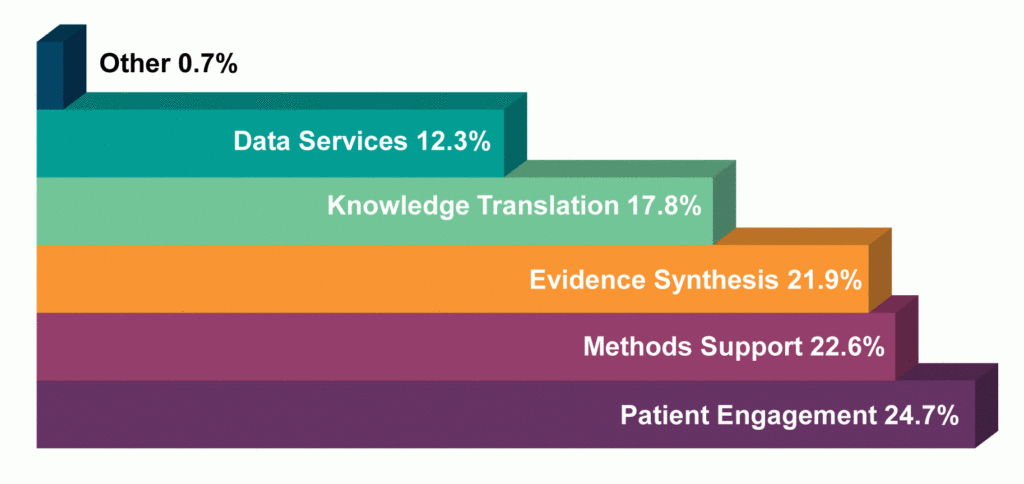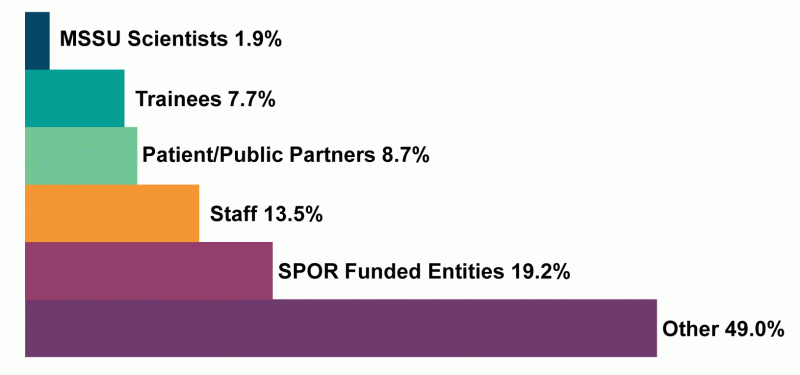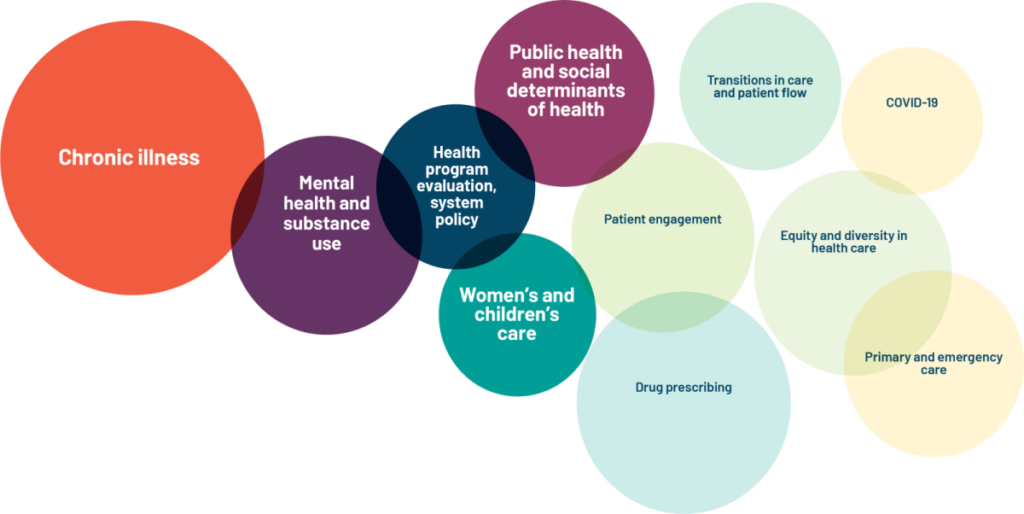
Report to Community 2023
A Year of Patient-Oriented Progress in Health Research
- By the Numbers
- Our Achievements
- Financials
Improving the health of Maritimers through patient-oriented research.
At the Maritime SPOR SUPPORT Unit (MSSU), we bring the voice of lived experience to health research. When health research is done in partnership with patients and communities, it leads to innovative health care solutions and ultimately better patient outcomes. The overall quality and impact of health research improves when patients and public are part of the team.
We are one of 10 SPOR (Strategy for Patient-Oriented Research) units across Canada that provide specialized services to researchers, patients, clinicians and policymakers to facilitate the engagement of patients, families and caregivers in the research process. We are all learning and growing together to create a culture of continuous improvement, also known as a learning health system.
Our Core Areas: Click each title for highlights.
Data Platforms and Services
2022-23 Highlights
- 14 new datasets
- 255 unique data linkages
- 5 multi-jurisdictional requests at HDNS and 2 new partnerships
Learning Health Systems
2022-23 Highlights
- Environmental scan
- LHS infographic and systematic review
Patient Engagement
2022-23 Highlights
Effective Collaboration and Alignment
2022-23 Highlights
Equity, Diversity, Inclusion and Accessibility
2022-23 Highlights
Message from MSSU Co-Leaders
We are pleased to present our 2022-2023 Report to Community in a new digital format. We invite you to explore our online content to gain insights into the achievements, partnerships, and transformative initiatives that have defined our journey this past year.
We’ve had an incredible year marked by significant progress, meaningful collaborations, and a steadfast commitment to patient-oriented research (POR) and community engagement.
In the past year, we’ve witnessed remarkable growth and achievements within our regional data centres, with notable additions of diverse datasets at New Brunswick Institute for Research Data and Training (NB-IRDT) and regular webinars about data services and access at Health Data Nova Scotia (HDNS) to expand how researchers, students and data partners engage with HDNS.
Our many projects and consultations, as you will read, are deeply aligned with provincial health priorities, and have a significant impact on patient care throughout the Maritimes. By working closely with our regional data centres, researchers, and Patient/Public Partners, we’ve been able to address critical healthcare issues that are directly relevant to the needs of our communities. In addition, we have continued to advance interprovincial projects, leveraging the expertise across provinces. As a result, our support is making tangible contributions to improving patient care, influencing healthcare policies, and driving positive changes in the delivery of healthcare services across the Maritimes.
We extend our heartfelt gratitude to our dedicated team, our invaluable Patient/Public Partners, health system partners, and our research communities for their unwavering commitment to advancing patient-oriented research in the Maritimes. Your support and collaboration remain the driving force behind our shared vision. Together, we are setting the course for a future in which healthcare is truly patient-centered, informed by robust research, and responsive to the needs of the people living in the Maritimes.

Dr. David Anderson, Nominated Principal Investigator

Marina Hamilton, Executive Director
BY THE NUMBERS
In 2022/23, our team dedicated 14,202 hours of expertise to help researchers conduct patient-oriented research; 25% of all requests were for patient engagement support. We trained 104 individuals in our patient-oriented research virtual sessions and connected Patient/Public Partners to 79 projects and 37 positions on governance committees. Our team initiated 32 evidence synthesis projects and produced various resources, including sex and gender considerations in research.
MSSU Scientists
Knowledge translation products created
Patient engagement opportunities posted to our website
341
Active research consultations
10
Trainee Support Program recipients
Support Services Requested

Patient-Oriented Research Training by Participant

New research consults initiated in 2022/23 addressing critical health care issues:

What do our stakeholders say?
Each year the MSSU undertakes an annual stakeholder survey to evaluate its activities, outputs and outcomes. In 2022/23 we received 101 survey responses from MSSU staff, Patient/Public Partners, researchers, government representatives, health care providers and administrators as well as organizations in both private and public sector. Each group was asked a series of questions.
*Detailed statistics and response rates are available in the full report available upon request.

Maritime Health Research Summit
The first Maritime Health Research Summit was an overwhelming success, bringing international attention to the Maritime SPOR SUPPORT Unit (MSSU) while reaffirming our commitment to ensure equity, diversity, inclusion, and accessibility is addressed throughout all aspects of our work.
On June 23, 2022 the MSSU hosted Wise Practices in Health Equity, a virtual event featuring world-renowned researchers and speakers from across Canada. The event attracted more than 230 registrants from all over Canada as well as internationally, bringing together a diverse group of researchers, health professionals, patients, and decision-makers. The summit was our top visited webpage in 2022 and brought a 30% increase in new visitors to the mssu.ca site.
Maritime Health Research Summit
The first Maritime Health Research Summit was an overwhelming success, bringing international attention to the Maritime SPOR SUPPORT Unit (MSSU) while reaffirming our commitment to ensure equity, diversity, inclusion, and accessibility is addressed throughout all aspects of our work.
On June 23, 2022 the MSSU hosted Wise Practices in Health Equity, a virtual event featuring world-renowned researchers and speakers from across Canada. The event attracted more than 230 registrants from all over Canada as well as internationally, bringing together a diverse group of researchers, health professionals, patients, and decision-makers. The summit was our top visited webpage in 2022 and brought a 30% increase in new visitors to the mssu.ca site.

Jackie Huberman, PhD, CPsych
Postdoctoral Fellow, Couples and Sexual Health Research Laboratory, Department of Psychology and Neuroscience, Dalhousie University

Keeping Up with KT
The Keeping up with Knowledge Translation bi-monthly webinar series attracted more than 700 registrants to five sessions. In 2022/23, sessions focused on aspects of patient and public engagement within research and learning health systems, highlighting research and organizations in the Maritimes. Patient/Public Partners and community representatives co-presented three sessions, bringing value lived expertise to discussions.
OUR ACHIEVEMENTS
From partnering with a New Brunswick researcher to help them meaningfully engage patients in a Hospital to Home pharmacy project to engaging the public in shaping the Nova Scotia Health Equity Framework, we are leading the shift in how health research is conducted in the Maritimes with a commitment in equity, diversity, inclusion and accessibility.
The unique strength of the MSSU: Fostering collaborative health research across three provinces
The Maritime SPOR SUPPORT Unit (MSSU) stands out as the only SPOR unit across Canada offering support services to three provinces – New Brunswick, Nova Scotia and Prince Edward Island. Our unique regional collaboration paved the way for two ongoing interprovincial health research projects* tackling important health topics: children with medical complexity and mental health impacts of COVID-19.
This geographical diversity brings together researchers, patient/public partners, healthcare professionals and institutions from different backgrounds, fostering a rich tapestry of ideas and expertise. Researchers can access a broader spectrum of data, leading to more comprehensive and insightful studies.
The MSSU’s approach is not just about the projects at hand; it’s about fostering relationships among researchers, healthcare providers, patients, community partners and institutions. These bonds are the bedrock of future research endeavors, ensuring that the Maritimes remain at the forefront of healthcare innovation.
Both interprovincial projects started from existing connections built between the MSSU and Maritime research community. The COVID-19 study was a natural progression following similar studies in New Brunswick and in Nova Scotia. Interprovincial projects are a logical approach in advancing pediatric healthcare in the Maritimes given that all three provinces are served by the IWK children’s hospital. Findings from both projects are expected to be released in 2024.
“The field of implementation science and Learning Health Systems are key areas of focus at the MSSU. Identifying problems, identifying solutions to those problems, and measuring the impact of those solutions is so important. This requires collaboration and relationship building,” said Amy Grant, Senior Health Policy Researcher at the MSSU. “These projects are the seeds to continued collaboration and have already sparked conversations about future interprovincial projects.”
By building strong relationships and generating new projects, the MSSU is poised to make a lasting impact on healthcare research in the region.
*An MSSU interprovincial project involves at least two Maritime provinces.

Have an idea for an interprovincial project?
New Orientation Guide: Highlights important link between Patient/Public Partners and research
The MSSU Patient/Public Partner Orientation Guide was co-developed by MSSU Patient/Public Partners and MSSU staff. The working group created and curated content to support both new patient/public partners and researchers on how to work together in health research. This living document was a key activity in the 2022/23 workplan and has become an essential onboarding guide for the MSSU. It is also easily accessible on our website.
“I think it’s incredibly important to have the orientation guide for patient partners. First thing, it shows patient partners that the MSSU invests in the importance of that position within research. Second, it makes all the information very accessible and inclusive, considering we are including a glossary of acronyms and more. As a Patient/Public Partner, I would have loved to have had the opportunity to review an orientation guide prior to doing any projects, as that knowledge transfer would have been critically valuable and given me the confidence to be a working member of a research project.” – Linda Verlinden, MSSU Patient/Public Partner
Advancing Digital Health with Evidence-Based Research
MSSU partners in collaborative literature review to support SPOR-funded entity
In the ever-evolving landscape of healthcare, collaboration is key to driving progress and innovation. Recently, a unique collaboration unfolded in the Maritimes that serves as an exemplary model of a learning health system. This collaborative effort involved various stakeholders, including knowledge users, content experts, and a patient partner, all working together. The result was a rapid scoping review for a national not-for-profit organization, Canada Health Infoway (Infoway). Infoway launched PrescribeIT®, an e-prescribing service to revolutionize prescription management. Recognizing the need for robust evidence, Infoway approached the SPOR Evidence Alliance to broker two rapid scoping reviews: one about e-prescribing and opioids, and the other about e-prescribing and medication safety.
The opioids review went to a team at the University of Toronto, and the medication safety review went to MSSU Learning Health System Science Leads Drs. Janet Curran and Christine Cassidy’s Strengthening Transitions in Care (STIC) Lab at IWK Health. With the support of MSSU’s Senior Evidence Synthesis Consultant Leah Boulos, a Halifax team of content experts including pharmacists, healthcare providers and a Patient/Public Partner was assembled to provide input on the project. Working with the review team of research assistants and associates at the STIC Lab, the rapid scoping review report was completed in about three months and delivered to Infoway. A full manuscript has now been submitted to an academic journal.
“Overall, this was really an ideal example of all the pieces working together: SPOR-funded entities cooperating to support a local research team, producing a rapid, high-quality product for a national not-for-profit, and incorporating the review team’s methodological expertise with the expertise of the knowledge users and content experts,” says Boulos.
Rapid reviews have also been conducted with Patient/Public Partners to evaluate COVID-19 drugs in Nova Scotia.
New Brunswick Institute for Research Data and Training: A leader in cutting-edge data
New Brunswick Institute for Research Data and Training (NB-IRDT) continues to strive to be at the forefront of fostering impactful research, data accessibility, and knowledge sharing. In the past fiscal year, the Institute has added 13 additional datasets to their data holdings, bringing the total number of available data sets for research to 100, expanding their capacity to provide valuable insights into health, education, and social sciences. Moreover, the Institute hosted eight research knowledge sharing events with government in areas such as mental health, frailty, continuity of physician care and innovative technology to aid older adults age in place. These sessions, available on the NB-IRDT YouTube channel, have not only facilitated open dialogues but also serve to inform policy decisions that directly benefit our community. The number of approved research projects continues to grow with 15 new research projects initiated this year. Their mission to bridge the gap between data and action remains steadfast. They are excited to have enabled numerous researchers to turn these data into actionable insights for the province.
MSSU New Brunswick team: Mixed-methods research to improve care for rural oncology patients
Despite the association between longer survival and novel therapies, people living in rural communities are often faced with lower access to these therapies due to limited cancer care visits and follow-up compared to their urban counterparts.
By bringing together clinicians and Patient/Public Partners, the study, Evaluation of quality improvements to telehealth for rural oncology patients, will inform further improvements to a Fredericton telehealth system that recently changed how it provides healthcare to people in rural areas.
“Not everyone has the means to travel to regular appointments or the voice needed to self-advocate, ask questions, discuss concerns, side-effects or treatment schedules which can be interrupted for many reasons… so when this study came up, it was an opportunity to reflect on my own experience and the struggles others face when living in a rural area,” said Heather Hogan, MSSU Patient/Public Partner. “It is so important for the healthcare system to understand the needs and supports that should be in place for rural oncology patients.”
When Heather, who lives in a rural town, was diagnosed with cancer she was lucky to have chemotherapy at her local regional hospital and a spouse to support her on visits with her oncologists and radiologists in Saint John.
The research team will establish a baseline of care by looking at past medical records to see how things like treatment interruptions, delays, missed doses, and patient participation in clinical trials changed before and after the telehealth improvements. They’ll also check things like how long patients survived without their condition getting worse and overall survival. Next, they’ll talk to patients and healthcare providers in interviews to understand what they think about telehealth and how it’s working for them. Lastly, the team will bring together doctors and patients to talk about the study’s results and figure out what they mean for the healthcare program.
Dr. Luisa Galvis and Samantha Fowler, MSSU Clinical Research Manager in Saint John, were awarded Best Joint Oncology Presentation at the November 2022 New Brunswick Health Research Foundation Conference for this MSSU priority project.
Movement Matters: Exercise improves outcomes for people with osteoarthritis
In 2022/23, the MSSU released a summary report: Current Management and Health Care Use for People with Osteoarthritis and infographic: Osteoarthritis in the Maritimes detailing key findings from a study examining self-reported characteristics of people living with and without OA in the Maritime Provinces.
The research revealed people with osteoarthritis who had low physical activity levels had more additional diseases than those without osteoarthritis who also had low activity levels. Also, people with osteoarthritis who reported higher physical activity levels reported less opioid use, which suggests a possible protective effect of increased physical activity on the use of pain medications, particularly in early stages of the disease.
In this project, identified by stakeholders as a priority health topic, researchers used existing data from the Atlantic Partnership for Tomorrow’s Health (PATH) in all three provinces. For Nova Scotia specifically, the Atlantic PATH data was combined with administrative data accessed through Health Data Nova Scotia. This helped us see how people in Nova Scotia with and without osteoarthritis use health care services.
FINANCIALS
MSSU is funded by Canadian Institutes of Health Research with a 1:1 match with provincial funding partners. The Maritime funding partners include New Brunswick Department of Health, Nova Scotia Department of Health and Wellness, Prince Edward Island Department of Health and Wellness, the University of Prince Edward Island and ResearchNB.
Financial Summary | 2022/2023 |
|---|---|
Salaries | $3,000,740 |
Operations | $284,823 |
Total Expenses | $3,285,563 |
Our Funders
MSSU is funded by Canadian Institutes of Health Research with a 1:1 match with provincial funding partners.
Keeping Up with KT
Current Management and Health Care Use for People with Osteoarthritis
Uptake of community pharmacist prescribing over a three-year period
Increased self-reported pharmacist prescribing during the pandemic
Mental Health Impacts of COVID-19 on Nova Scotians: An Update to the 2020 Survey
Choosing wisely: Imaging for lower back pain
Climate change sensitivity profiles for New Brunswick Health Council communities
Events and Webinars
Current Management and Health Care Use for People with Osteoarthritis
Uptake of community pharmacist prescribing over a three-year period
Pharmacist Prescribing Research Brief
Increased self-reported pharmacist prescribing during the pandemic
Mental Health Impacts of COVID-19 on Nova Scotians: An Update to the 2020 Survey
Choosing wisely: Imaging for lower back pain
Climate change sensitivity profiles for New Brunswick Health Council communities